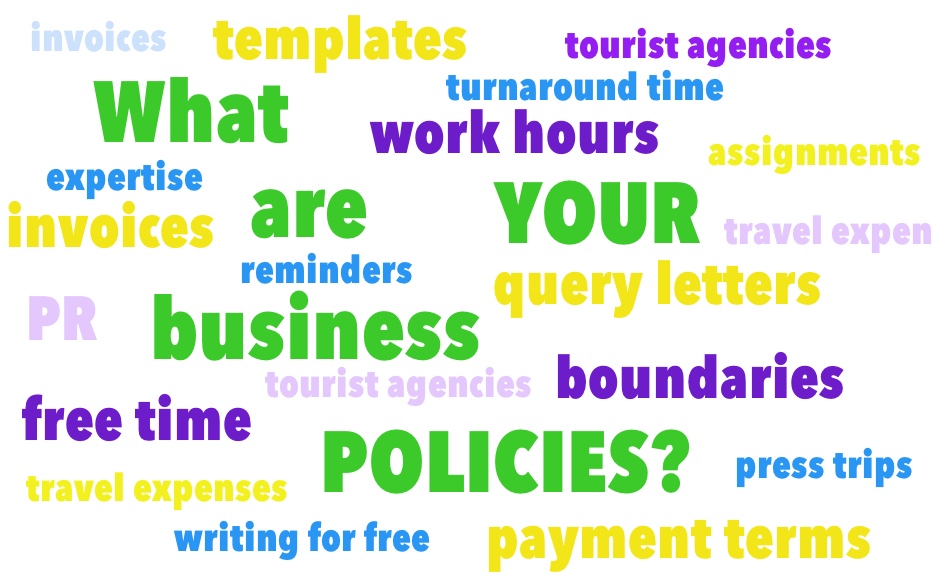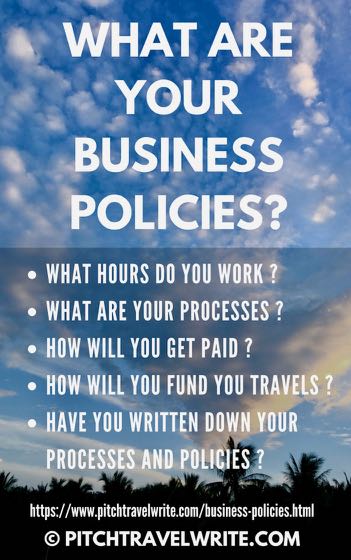- Home
- Business Basics for Travel Writers
- Business Policies for Travel Writers
Business Policies
for Travel Writers
By Roy Stevenson
Business policies are important to freelance writers - and probably the least interesting aspect for most travel writers. We love to travel and we love to write, but we hope that everything else will take care of itself. That doesn’t happen unless you’re only doing travel writing for free or just for fun.
The business of selling articles is usually my focus. As writers, it’s important to get published and earn money. But as you get more serious about making money with your writing, it’s also important to have a few other business practices in place.
Specifically, you need to have some business policies about travel, about how and when you do your work, and some policies around getting paid.
At this point you might be thinking, “but I’m my own boss - why would I need policies?”
Actually, that’s exactly why you need business policies. You are your own boss, but freelance travel writers work for many people. You work for editors. You work for tourist agencies, PR companies, and your hosts at destinations when you write a story about their destination. If you don’t have rules (or policies) then someone else’s rules just might apply.
It’s better to create your own rules.
When you have your own rules, or business policies, it conveys professionalism to others. When you are clear about your policies, you can tell someone “This is my business policy about …” and you’ll sound awesomely confident. You’ll inspire trust.
Here are four places where you will want to consider having business policies:
Your Work Hours
One of the biggest complaints I hear from writers is that they have trouble sitting down and doing their work. Or, when they do sit down, they keep getting interrupted.
The solution: create work hours. Pretend it’s a job (it is). Sit down and do your work during specific hours each day. Let your family and friends know when you are “at work”.
When I began my freelance writing career, friends called me asking for all sorts of favors. One friend called and asked me to coach (for free) a kids’ rowing team.
For some reason, the words “I’m a freelance writer” seems to convey the message “I’m sitting around and doing nothing” to other people. They don’t understand that you have work to do in order to bring in income. I guess they think being your own boss means “I’ve got lots of free time."
Having work hours and communicating them to friends and family sets boundaries. You probably won’t be available to coach the kids’ rowing team, unless it’s something you really want to do.

Of course, it’s not just other people who pull you away from your work. We also do it to ourselves. Do you procrastinate about getting your work done by hanging out on Facebook, or checking email a little too often?
Having work hours is a good way to stop procrastinating. If you sit down at your computer and work at specific times every day, you start getting more work done. It’s magic.
How You Do Your Work

There are several situations where you might need a policy. Here are some of them...
- Will you ever write an article about a topic you are not interested in, or not an expert at, or cannot find an expert to help with?
- If someone calls you with a request, are you willing to write an article that you are not the least bit interested in?
- Do you have templates for your query letters, so you’re not reinventing it each time? The same goes for invoices, reminders and any other repetitive task.
- Do you know when to stop sending out queries, so you can catch up with your writing? What is the ‘critical mass’ of articles that you allow to pile up before you stop sending out queries and switch your focus to writing the articles?
- What is your turnaround time when editors ask you to caption photos, or when they send you articles for final proofing?
These are all questions about how you do your work. Do you have answers?
Putting
some structure and boundaries around how you do your work will help you
stay focused and organized, and keep you out of trouble when it comes
to meeting deadlines and working with editors.
How You Get Paid
Having a standard way to invoice editors makes the task easier. For example, I always send invoices at the same time I submit my articles, and I send it via email. Some people use PayPal. How do you do it?
Do you have a system for reminders when they don’t pay on time? Will you send a reminder after 15 days? Or after 30 days?
How will you handle deadbeat editors? Knowing exactly what you will do in these circumstances beats agonizing over it and doing nothing.
How you get paid also includes the issue of writing for free. Are you willing to write for free if the editor tells you they don’t pay their writers? Or will you say “no, thank you” and keep looking for a paying publication?
Business Policies around Travel
Will you travel on assignment even if you have to pay some of your expenses? Unless you have another source of funding, it’s very important to have policies about trip expenses.
Many travel writers I know only take a trip if all expenses are paid. Others are willing to fund some portion of their travel and combine it with a vacation.
You need to be clear about what you’re willing to pay for, and when you will walk away from an enticing trip because the personal expenses are too steep. It’s often difficult to recoup your travel costs with what you’re getting paid for the article(s). Know your limits.
Will you travel without an assignment?
My policy for this is “no, I won’t travel without an assignment”. I always pitch articles to editors before I take a trip. Once I have an assignment, then I begin setting up my travel plans. When I’m invited on a press trip, I don’t accept the invitation until I have an assignment.
The reason I do this is so that I’m not scrambling around after the trip trying to find an outlet for an article. This is stressful, and often unsuccessful. It’s not worth it to me, so I sell articles before I travel.
If I have an assignment, I can go on the trip with a clear conscience and enjoy myself knowing that my obligation to my hosts is already confirmed.
How far in advance do you contact tourist agencies prior to travel? This can vary, depending upon the distance you’re traveling. Local trips might only need planning a month in advance; international trips six months in advance.
What’s your policy for visiting your hosting tourism agency when you arrive at your destination? Is it the first thing you do? Do you make advance arrangements with your contact? Where will you collect your media kit?
Write it Down
Are your business policies documented? Seems silly, right? You’re your own boss. Can’t you just keep everything in your head?
Yes, if you want to drive yourself crazy.
There’s something about writing things down that brings clarity of thought, especially when you're just getting started. It helps you think things through instead of just having a general idea in mind. Even if no one else ever sees your business policies, I recommend that you write them down.
Here’s why. Some day you will need to articulate one of those policies to someone. If you can’t articulate your business policies to yourself by writing them down, you won’t be able to communicate them to others. Instead, you’ll find yourself stumbling over words and probably contradicting your own policies.
Take some time to write down your important policies to make them clear in your own mind so that when the time comes, you can communicate them to others.
One of the most important things to write down are your goals as a travel writer. Do you know your goals? This article will help you clarify your goals - and see where you fit among other travel writers.
There will be times when you’ll need to enforce your own policies. This sometimes takes courage. Here are some examples:
A PR agency invites you on a press trip and you can’t seem to find any outlets for potential stories. You don’t want to say no because you’re afraid you won’t be invited on future press trips. If you can clearly communicate your policy “I only go on press trips when I have an assignment”, the PR rep will understand and respect that.
Or, an editor is late (very late) in paying you for a published article, and you’re afraid to keep sending those reminder invoices every 30 days in case you might ‘lose’ an editor. He seemed like a nice guy. And you’re afraid to elevate the late payment to more serious techniques to collect your payment. If you have a solid payment policy and an escalation process, it’s not personal. You just follow the process so you can get paid the money owed to you.
Or when your friend is baffled about why you don’t have the time to coach his kids’ soccer team, you can say “sorry, but that conflicts with my working hours, I’m not available to do that.”
Knowing your business policies, and being able to communicate them clearly, will help you to be perceived as a professional. You’ll feel better about the outcome - because you made the rules, and you are in control of the conversation and your own business policies.
Do you need help writing query letters that catch the attention of editors?
If you're looking for a guide to help you write query letters to editors, I've written The Complete Guide to Query Letters for Travel Writers to help you. It includes everything you need to know about query letters, along with 20 sample query letters that you can use as templates for your own queries.
Related articles that will interest you:
Business Basics for Travel Writers
Dealing with Unresponsive Magazine Editors
Write for Free
Seven Ways to Increase Your Productivity

Roy Stevenson is a professional travel writer and the author of www.PitchTravelWrite.com. Over the past ten years, he’s had more than 1000 articles published in 200 magazines, trade and specialty journals, in-flights, on-boards, blogs and websites and has traveled on assignment around the U.S. and to dozens of international destinations.
IF YOU ENJOYED THIS POST, GET UPDATES. IT'S FREE.















